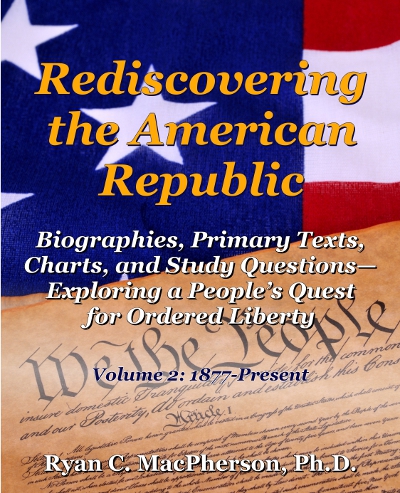A high school student who is writing an essay concerning history recently interviewed me via email. She asked:
- Why is it important to study history? What is there to learn from the past?
- Do you feel as though people in today’s society uses the guidance history can provide as much as they should? Why do you think this?
- Can you provide any examples of when past events could be used to better society’s future?
Following are my replies.
Why is it important to study history? What is there to learn from the past?
We learn from experience. We learn from our own experiences. We learn from what family and friends tell us about their life experiences. We also can obtain “surrogate experience” through studying the lives of other people whom we have never met. History enables us to do this. Wisdom comes, at least in part, from experience. Therefore, history offers us a source of wisdom—if we use it well, that is.
Do you feel as though people in today’s society uses the guidance history can provide as much as they should? Why do you think this?
No. Sadly, people are largely ignorant of history today. On my bookshelf I have a high school book on the history of England that was used in American high schools 100 years ago. If a teacher were to assign the same book today, the students would have to be in their third or fourth year of college to understand it. I’m not joking. Our schools have totally dumbed-down the curriculum. It used to be typical for a student in college to take at least one semester of world history and at least one semester of American history. Now many colleges do not even require history. Some colleges that claim to require “history” allow courses that barely cover history to count as if they were “history.”
The K-12 standards adopted by various states for social studies and history have changed dramatically over the past 20 years or so. Here you can find my assessment of recent changes in Minnesota. If you’re really curious, please also follow the link there to my written testimony on that matter. Sadly, the judge rejected my advice and the advice of other experts who testified with me. As a result we now have state standards that omit numerous key people from the “must learn” list:
- Julius Caesar
- Charlemagne
- Joan of Arc
- Christopher Columbus
- Leondardo da Vinci
- Martin Luther
- Henry VIII
- Elizabeth I
- William Penn
- Thomas Paine
- Sacagawea
- Chief Joseph
- Abraham Lincoln
- Elizabeth Cady Stanton
- Theodore Roosevelt
- Adolph Hitler
- John F. Kennedy
- Margaret Thatcher
- Osama bin Ladin
They were in the old standards. They are not in the new standards. Unbelievable, isn’t it?
Can you provide any examples of when past events could be used to better society’s future?
I can think of many. One of my favorites comes from the course I teach on the American Civil Rights Movement. I have students compare the biographies of Malcolm X and Martin Luther King Jr. They both promoted civil rights for African Americans, but they went about it in very different ways, in part because they had different sets of values. MLK worked within the system, challenging whites to own up to the words of their white ancestors from the Declaration of Independence and Constitution. His partnership with white politicians was largely successful. Malcolm X, by contrast, criticized whites and sought a solution in black supremacy. His efforts were far less successful. One of the lessons that I draw from this is that our greatest strength as a nation comes from within our tradition. I think our founding fathers did an excellent job of starting this country. They weren’t perfect. Some of them even owned slaves. But, they charted a course that eventually led to the liberation of slaves and equal rights for blacks and whites. The ideas behind the American Revolution were good ideas, ideas worth preserving. Recognizing this was the genius of MLK, as compared to Malcolm X.
Another example comes from world history. Nearly every major European country changed forms of government multiple times in the past 200 years. Britain was exceptionally stable, compared to France, Germany, Italy, Austria, Russia, and others. Similarly, America is exceptionally stable—the same written constitution for over 200 years, albeit with 27 amendments. Only once did a presidential election lead to bloodshed (the Civil War). Compare that to the rest of the world. Listen to the evening news and discover how much turmoil there is out there. So, what’s the difference? Why are Britain and America so unique in their stability? The answer is that their forms of government fit human nature better than other forms of government do. William Blackstone’s Commentaries on the Laws of England (circa 1770) would be a great resource if you’re curious about how this came about. In brief, the British and American traditions are built upon natural law, the idea that God created us with inalienable rights to life, to liberty, and to property, and that the chief purpose of the government is to protect those rights. The English philosopher John Locke wrote this in 1690. Jefferson wrote it again in 1776. Blackstone presented a systematic summary of the English common law, which went into greater detail but basically said the same thing.
For More Information
Here are some disciplines I teach at Bethany Lutheran College:
- History Major
- Broad Field Social Studies Major (including Secondary Education Licensure)
- Legal Studies Major
- Philosophy Minor
Dr. Ryan C. MacPherson is the founding president of Into Your Hands LLC and the author of several books, including Rediscovering the American Republic (2 vols.) and Debating Evolution before Darwinism. He lives with his wife Marie and their homeschooled children in Casper, Wyoming, where he serves as Academic Dean at Luther Classical College. He previously taught American history, history of science, and bioethics at Bethany Lutheran College, 2003–2023 He also serves as President of the Hausvater Project, which mentors Christian parents. For more information, visit www.ryancmacpherson.com.


